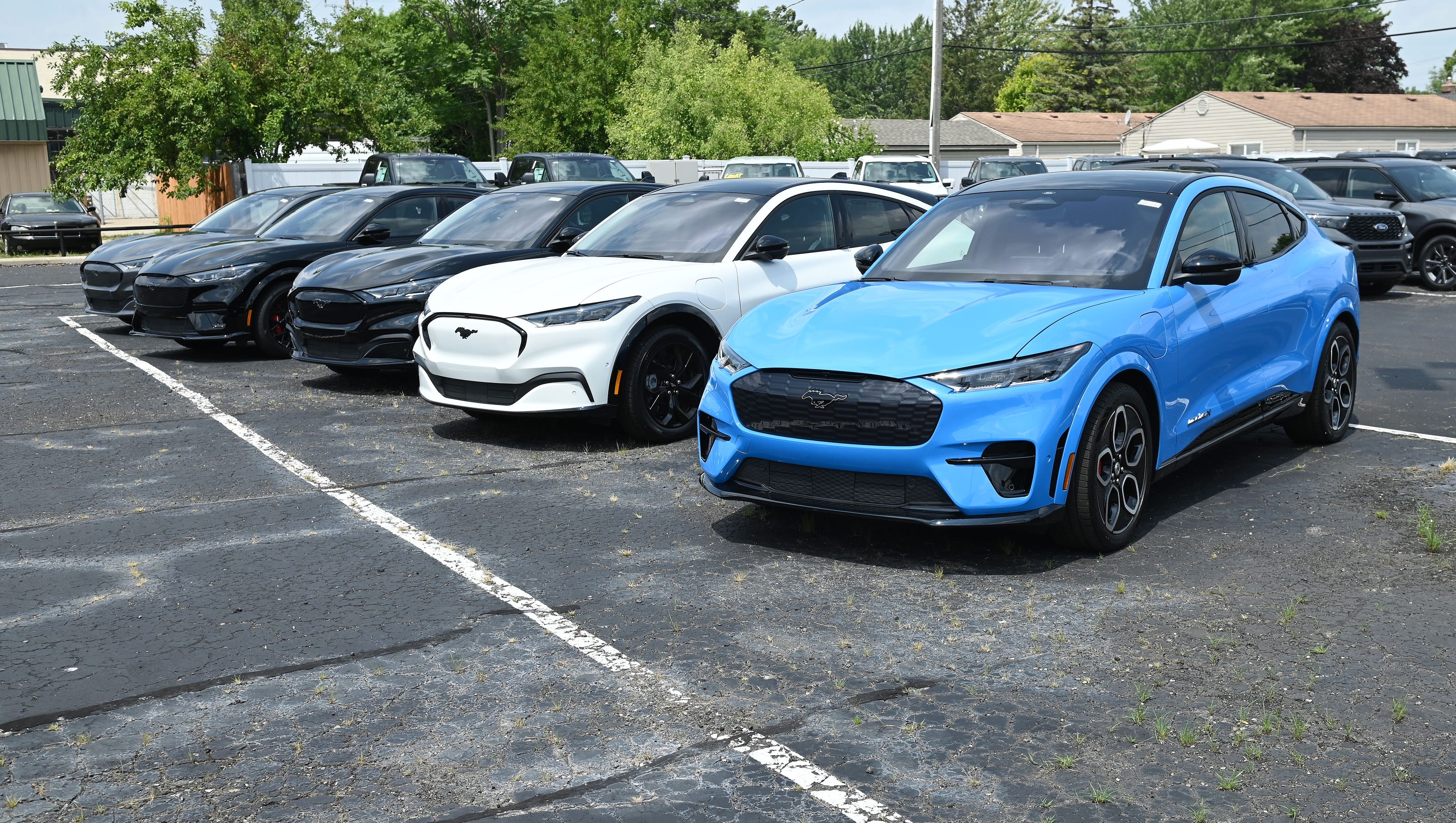Auto Dealerships Step Up Resistance To Mandatory EV Sales

Table of Contents
Financial Hurdles and Investment Costs
The transition to selling and servicing EVs presents substantial financial challenges for auto dealerships. Meeting mandatory EV sales targets requires significant upfront investments that many dealerships find difficult to absorb. These include upgrading facilities to accommodate EV sales, investing in the necessary infrastructure, and training staff.
- High Upfront Costs: Dealerships need to invest heavily in EV charging stations, specialized tools for EV maintenance and repair, and training programs for technicians to acquire the skills needed to service these vehicles. This represents a considerable capital expenditure, often exceeding the financial capacity of smaller dealerships.
- Inventory Risk: Uncertainty surrounds consumer demand for EVs, creating risks associated with inventory management. Investing in a large inventory of EVs carries the risk of unsold vehicles and potential financial losses, particularly given the higher price point of many EVs compared to their gasoline-powered counterparts.
- Infrastructure Investment: Beyond charging stations, dealerships need to upgrade their electrical grids to handle the increased power demands of EV charging. This often involves extensive electrical work and significant investment.
- Lack of Government Support: Many dealerships argue that insufficient government support and inadequate incentives hamper their ability to make the necessary investments. The lack of financial assistance exacerbates the already considerable financial burden.
Bullet Points:
- Dealerships require substantial capital investment for EV charging infrastructure, potentially exceeding hundreds of thousands of dollars.
- Training technicians on EV maintenance and repair, including battery replacement and high-voltage system work, adds considerable expense.
- Managing EV inventory presents unique challenges, including the need for specialized storage to protect batteries and prevent damage.
Challenges in Consumer Adoption and Education
Even with the necessary infrastructure, the success of mandatory EV sales hinges on consumer adoption. Currently, several factors hinder widespread consumer acceptance of EVs. Dealerships find themselves on the front lines of educating consumers and addressing their concerns.
- Addressing Consumer Concerns: Many potential EV buyers grapple with "range anxiety"—the fear of running out of battery power before reaching a charging station. Educating consumers about available charging infrastructure and range capabilities is crucial to alleviate this anxiety.
- EV Education: Dealerships need to actively educate consumers about the benefits of EVs, including lower running costs, reduced emissions, and government incentives. This requires dedicated staff training and informative marketing materials.
- Charging Infrastructure: The lack of a widespread and reliable public charging infrastructure remains a major barrier to EV adoption. Consumers need confidence that they can conveniently charge their EVs when away from home.
- Overcoming Misconceptions: Negative perceptions about EVs, including concerns about charging time, battery lifespan, and resale value, must be addressed through effective communication and demonstrable evidence of EV performance and reliability.
Bullet Points:
- Many consumers remain hesitant about transitioning to EVs due to range anxiety and concerns about charging convenience.
- Lack of readily available public charging stations, particularly in rural areas, significantly hinders widespread EV adoption.
- Dealerships play a crucial role in educating consumers about the benefits of EVs, dispelling myths, and providing personalized advice.
Logistical and Operational Concerns
Beyond the financial and consumer-facing challenges, dealerships also face significant logistical and operational hurdles in adapting to the EV era.
- Specialized Skills and Equipment: EV repair and maintenance require specialized skills and equipment, differing considerably from gasoline-powered vehicles. This necessitates investment in training and specialized tools, increasing service costs.
- Technician Shortages: The automotive industry faces a shortage of trained technicians, and the transition to EVs exacerbates this issue. Finding and training technicians with the expertise to work on high-voltage systems and complex EV components is a significant challenge.
- Supply Chain Issues: The EV supply chain is complex, and delays in parts availability can lead to extended repair times and customer dissatisfaction. This can impact dealership efficiency and customer loyalty.
- Adapting Service Departments: Dealerships must adapt their service departments to accommodate the unique needs of EVs, including dedicated spaces for charging and specialized diagnostic equipment.
Bullet Points:
- EV repair requires specialized training and tools, leading to increased service costs and potential delays.
- Potential delays in EV repairs due to parts shortages can negatively impact customer satisfaction and dealership reputation.
- A shortage of skilled EV technicians could limit service capacity and increase waiting times for customers.
Government Policy and Regulatory Impacts
Government policies and regulations play a crucial role in shaping the transition to EVs. Dealerships are concerned that current approaches lack sufficient consideration for the practical challenges they face.
- Unrealistic Sales Targets: Dealerships argue that many mandatory EV sales targets are unrealistic and fail to account for the challenges in consumer adoption and infrastructure development. These unrealistic targets threaten the profitability and viability of dealerships.
- Lack of Flexibility: Dealerships advocate for a more flexible and phased approach to EV mandates, allowing them time to adapt their operations and infrastructure without jeopardizing their businesses.
- Collaboration and Support: Dealerships emphasize the need for greater collaboration between government agencies and the automotive industry to ensure a smooth and effective transition to EVs. This includes providing financial support, developing clear guidelines, and addressing infrastructure needs.
- Increased Government Support: Dealerships urge governments to increase financial support and incentives to help offset the high costs associated with transitioning to EV sales and service.
Bullet Points:
- Unrealistic EV sales targets could force dealerships out of business, particularly smaller and independent dealerships.
- A phased approach to EV mandates would allow dealerships to adapt more effectively, reducing the risk of financial strain.
- Collaboration between government and industry is crucial for successful EV adoption, ensuring that policies are practical and achievable.
Conclusion
The resistance from auto dealerships to mandatory EV sales underscores the complexity of transitioning to a cleaner transportation future. Addressing the financial burdens, consumer education challenges, logistical hurdles, and the impact of government policies requires a collaborative effort. Finding a balance between ambitious EV adoption goals and the practical realities faced by auto dealerships is paramount for a successful and sustainable transition. Ignoring the concerns surrounding mandatory EV sales could have severe consequences for the automotive industry and the overall success of the electric vehicle revolution. Open dialogue, realistic policy implementation, and a pragmatic approach are vital to overcome the resistance to EV adoption and pave the way for a truly electric future. The future of EV adoption depends on finding solutions that work for all stakeholders.

Featured Posts
-
 Kawasaki Ninja Series R45 000 Discount Available Now
May 30, 2025
Kawasaki Ninja Series R45 000 Discount Available Now
May 30, 2025 -
 The Vaccine Packaging Market Current State And Future Projections
May 30, 2025
The Vaccine Packaging Market Current State And Future Projections
May 30, 2025 -
 Awstabynkw Ttqdm Bthbat Me Tsaed Wtyrt Mwsm Almlaeb Altrabyt
May 30, 2025
Awstabynkw Ttqdm Bthbat Me Tsaed Wtyrt Mwsm Almlaeb Altrabyt
May 30, 2025 -
 Book Your Luxurious 30 Minute Bubble Bath At Lush In Nyc 75
May 30, 2025
Book Your Luxurious 30 Minute Bubble Bath At Lush In Nyc 75
May 30, 2025 -
 Measles Outbreak In Kansas A Growing Concern
May 30, 2025
Measles Outbreak In Kansas A Growing Concern
May 30, 2025
